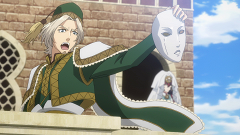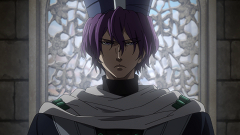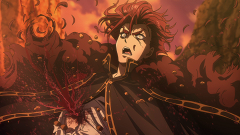Well, this is awkward. I’m so behind on Altair that even a double episode review isn’t enough to get us caught up. Two months ago, I made the decision to discontinue my coverage of this series once it hit the halfway point, and even though episode 13 functions as the true conclusion to this arc, I’m content to finish things here. There’s no sense in laying out each of my issues with the show – you can read past reviews for that – but to put it broadly, the entire production feels hurried, and not just in terms of its breakneck narrative speed. There’s some good dramatic material in Altair’s story, but in the hands of a conservative director and an overworked studio, it rarely came alive for me. There was a big exception to that rule in one of these two episodes, though, so let’s talk about it… after refreshing ourselves on the details of the anime.
Several weeks ago, we left off with a plot to assassinate the sultans of the Turkiyean territories, who would all be in one place thanks to Prince Orhan and Aishe’s wedding. Now, word of this plan makes its way back to the Divan in Turkiye, who send a pro-sultanate representative to the ceremony. The envoy makes a pit stop at Balaban’s doorstep, however, and spills the beans regarding the trap waiting for him in Kuluch. Armed with this information, Balaban (and the other sultans) choose to march their armies to the wedding and conduct a preliminary strike against their would-be killers. But this leaves their territory undefended, and Zaganos quickly moves to seize control of their major cities. The show later frames this as a cause-and-effect scenario, and given Balaban’s blinding pride, it kind of is, but I do wonder what would have happened if he had refused to attend the wedding. The political fallout from that disrespect is nothing compared to the potential loss of your country, or even your life. Uzun, in particular, should have called in sick on invasion day – his only interest ought to be the completion of the trade route that would secure his nation’s financial independence from Turkiye.
All of that aside, “The Prince of Swords” gets good right at the end, when Orhan’s father goes back on his pact with Mahmut. Fearing for the safety of his people if the bloodthirsty Balaban breaks into the city, he attempts to kill Aishe and offer her head as a gift to him. Orhan, driven by love for his bride-to-be, kills his father to save her life. What makes this an especially remarkable move is that, earlier in the episode, he had learned that Aishe was in love with her uncle, and had no desire to be married. This is a character who was played strictly for laughs until this point, so when he came before his royal guard and confessed to the murder, decrying his father’s cowardice and proclaiming his own ascension to the throne, I got chills. Whoever provided Orhan’s voice did a fabulous job with this material – I almost looked to see who it was, but then decided I don’t want to associate that performance with any other characters. Even though I won’t be watching beyond these episodes, I hope that Orhan has some part to play in Turkiye’s post-rebellion landscape.
Speaking of the rebellion, most of the second episode is dedicated to the military struggle between Balaban’s forces and Mahmut’s. Though our heroes are outnumbered 4 to 1, Balaban brings only 5000 men into battle, not wanting to lessen the glory of his victory with superior numbers. This turns out to be his undoing, as Mahmut is able to eliminate most of his troops before luring the survivors into a narrow valley. It’s in this remote setting that Beyazit’s trump card from last month is finally put to use, as his musketeers use their revolutionary firepower to pierce the shields of Balaban’s strongest soldiers. As for the Red Tiger himself, he dies in his brother’s arms, despairing at the fact that the only person who truly loved him also helped to engineer his downfall. There were several flashbacks to younger versions of Balaban and Beyazit throughout these episodes, and while none of them particularly moved me, they did establish the two men as fated opponents, despite their affection for one another as children and young adults. Balaban was too big and too colorful a character for the rigid world of Rumeliana, so if he had to go, at least it was with a bit of nuance.
That’s it from me where Shoukoku no Altair is concerned. There’s still another cour to go, so if you’ve been enjoying the ride, I hope the show stays on course. The new fall season has produced a handful of worthwhile shows so far, so I’m itching to start blogging one of those instead. Whichever series that ends up being, I hope you’ll stick around as we transition to a new story and a new set of characters. Thanks for reading.





SuperWooper thank you for the coverage. I will continue watching the show. If people are ok, and if I can find the time, I will make a end of the show review.
I’d be okay with another perspective on the series. We’ll be pretty busy with the yearly summary when Altair wraps in December, but try giving Aidan a shout in the chatbox after that.